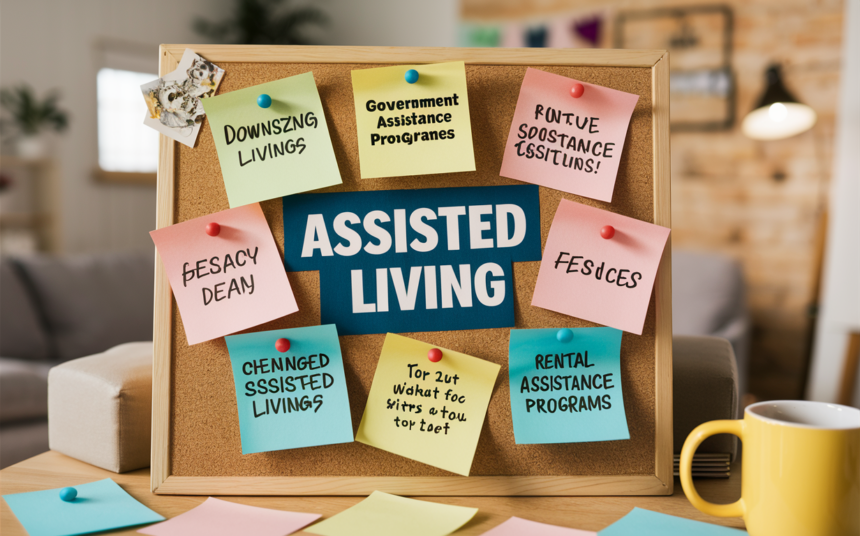The Growing Challenge of High Cost of Care
For many families, the rising expense of assisted living has turned a once-potential answer into an insurmountable financial barrier. Monthly rates can be greatly inflated by location, degree of care needed, and available amenities. Although they want to give aging loved ones the best available treatment is still strong, the financial consequences can be paralyzing. It is important to realize, nevertheless, that several paths exist to help with these costs.
Government Support: A Potential Lifeblood
For those struggling with How can I pay for assisted living with no money?, government programs might provide a vital lifeline..
Many states let Medicaid, a government-funded health insurance program for low-income people, cover assisted living expenses. States do, however, have very different eligibility criteria. People who want Medicaid have to fit particular income and asset criteria. Researching the particular Medicaid rules in your state can help you to ascertain eligibility and grasp the extent of coverage. Although Medicaid usually pays for treatment, residents are often in charge of personal needs including entertainment, clothes, and toiletries.
Designed to help low-income people—including seniors—who are blind or disabled financially, Supplemental Security Income (SSI) is a federal program. Although SSI benefits alone might not cover the cost of assisted living, they do greatly help with overall expenses. Recipients might also be eligible for Medicaid since SSI payments help to satisfy Medicaid’s income requirements.
The Department of Veterans Affairs (VA) provides pension and compensation programs among other benefits for veterans and their spouses. Specifically meant to help veterans with impairments needing daily support with activities of daily life is the Aid and Attendance pension. This advantage can enable financial support to assist in covering assisted living expenses.
Different Financial Plans
Apart from government support, numerous financial plans provide control of assisted living expenses.
Designed to pay for assisted living among other long-term care services, long-term care insurance (LTC) is Although LTC insurance should be bought far before needing care, it can offer a significant financial safety net. Usually paying payments over time, insurance policies assist in covering the expenses when a need for care develops.
Reverse mortgages let homeowners make use of the equity in their house. Reverse mortgages let homeowners get payments depending on the worth of their house, unlike a conventional mortgage whereby they pay the lender. Among the several expenses this money might help with are assisted living charges. But since a reverse mortgage can affect house ownership, one should give much thought to the terms and conditions of this kind of loan.
Some life insurance policies can be turned into cash value, which provides a financial tool to aid with assisted living expenses. But this choice can entail giving up the death benefit, hence it’s important to carefully consider the benefits and drawbacks.
Although it is not ideal, selling priceless items like stocks, bonds, or collectibles can provide money to help pay for assisted living expenditures. Still, you should speak with a financial expert and take into account the possible tax consequences of selling assets.
Original ideas and communal resources
Apart from conventional financing possibilities, investigating innovative ideas and local resources might offer great help.
Certain assisted living homes provide flexible payment schedules depending on the income of the residents. For those with limited means, these sliding fee scales might help to make treatment more reasonably priced.
For suitable people, government-assisted housing programs such as Section 8 vouchers can be a possibility. Although these coupons are mostly intended for rental accommodation, occasionally they can be used to help pay for assisted living at approved institutions.
Many non-profit groups provide senior financial aid or support programs. Investigating local choices can reveal priceless resources including counseling services, low-interest loans, and grants.
Including friends and family will offer both emotional and pragmatic help. Making a caring schedule, distributing transportation duties or helping with housework will help some of the load on carers and maybe lower the demand for full-time assisted living.
Appreciating the Expenses and Investigating Alternatives
Effective assisted living planning depends on an awareness of the elements influencing costs. Monthly rates can be greatly influenced by the facility’s location, degree of care, and facilities as well as by Investigating several assisted living choices in your neighborhood will enable you to evaluate expenses and choose the ideal value for your means.
Examining government initiatives and financial policies also calls for great thought. Crucially is knowledge of eligibility criteria, program advantages, and possible negative effects. Seeking advice and support from government institutions, elder law attorneys, and financial consultants can help you much.
Conclusion
Many families struggle financially in trying to afford assisted living. Still, it’s feasible to discover a workable solution that satisfies your loved one’s care demands without straying too far from your means by closely examining government programs, financial possibilities, and community resources. Developing a thorough plan can be much aided by consulting professionals in legal advice and financial guidance. Remember, you can control the related expenses and guarantee the best possible care for your loved one with careful planning, willingness, and the help of available resources.
Frequently Asked Questions (FAQs)
Can I be eligible for Medicaid if I own a house?
Limits on income and assets define Medicaid eligibility. Although eligibility may be affected by homeownership, there are asset protection techniques and exemption policies to take into account.
How does Medicare vary from Medicaid?
Whereas Medicaid is a state-run program for low-income people, Medicare is a federal health insurance program for those 65 years of age and above.
Can assisted living be paid for using my retirement funds?
Indeed, assisted living can be paid for using retirement resources such as IRAs or 401(k). Early withdrawals, though, can be subject to fines.
Does the government run any assisted living-specific initiatives?
Although there isn’t a specific government program for assisted living, various initiatives including Medicaid and SSI help with expenses.
In what ways might a nursing home differ from assisted living?
For those needing major help with daily tasks, a nursing home offers 24/7 medical treatment.
Though it doesn’t give the same degree of medical treatment as a nursing home, an assisted living facility provides support with daily living activities including washing, clothing, and medication administration.
Where might I locate reasonably priced senior living choices?
One can locate reasonably priced senior living in numerous methods.
You may:
See your local Area Agency on Ageing for more on accessible homes and assistance programs. Look at government-subsidized homes; Section 8 vouchers help with rent.
Research rental communities or senior housing cooperatives; these sometimes have fewer expenses than conventional assisted living facilities.
Could I be eligible for in-home care financial assistance?
Indeed, there are initiatives designed to assist with home care expenses.
A common choice is Medicaid, but eligibility differs according to state. Additional programs that might help include adult protective services and Veterans Affairs (VA) pensions.
Could a reverse mortgage be appropriate for me?
A reverse mortgage lets house owners 62 years of age or over turn home equity into cash. Although it can help with living expenses, it’s crucial to know the terms and possible negatives before deciding. See a financial advisor to ascertain whether this is appropriate for you.
Describes long-term care insurance coverage.
Long-term care insurance helps pay for assisted living or nursing home care among other long-term care expenses. This is a complicated product, hence before making a purchase, it is advisable to thoroughly go over policies and evaluate expenses.
As I make long-term care plans, how can I safeguard my assets?
There are various ways you could guard your valuables, including:
Medicaid planning is moving assets to fit eligibility criteria. Long-term care insurance lets you help pay for care without draining your resources. Establishing trusts and other legal documents will assist in safeguarding your assets in estate planning.





